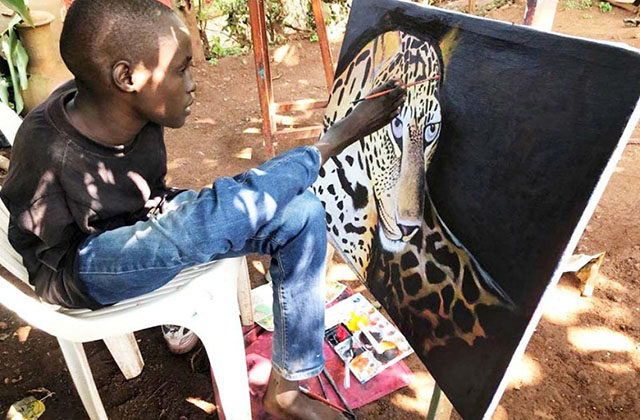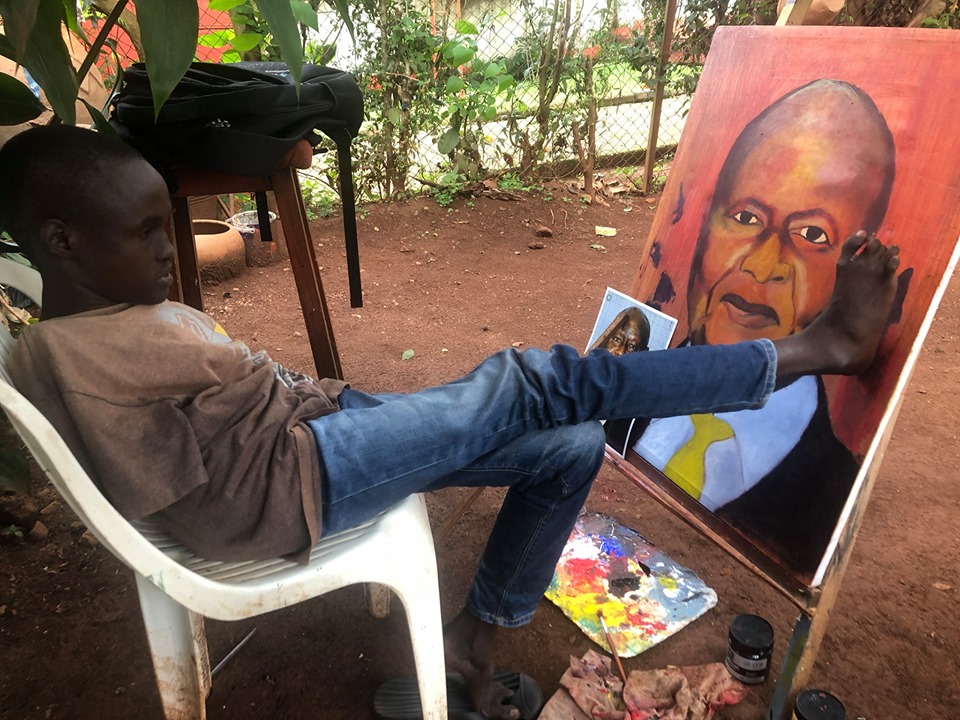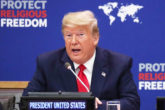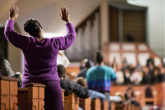
Richard Onama Opi works with Christian Charity World Vision specifically under the disability inclusive programming as a mentor to selected beneficiaries and members of staff. (Courtesy Photo)
Richard Onama Op was born without arms but his talent in fine art is unmatched. He draws striking images using his legs and feet, something that has made him outstanding both in his home town and at the university where he is currently pursuing a bachelor’s degree in art and industrial design.
The former World Vision beneficiary comes from Adjumani district, West Nile sub-region of Northern Uganda. Richard is multi-talented, an entrepreneur and motivational speaker.
A Difficult Childhood
He is the firstborn in a family of four and was orphaned at a very young age. Raised by his mother in a humble family, he started school late because it took him time to learn how to write using his feet. However, disability has not stood in his way in making a name as an artist.
Due to his difficult circumstances, in 2015 Richard was selected by World Vision to benefit from a Ministry of Foreign Affairs funded project, from Finland, which aimed to empower people living with disabilities in the district. “World Vision wanted to equip us with skills which we could use to support ourselves financially rather than begging from people. We were trained in liquid soap making for one day since the process was not complex,” Richard says.
After the training, he used the money he made by drawing images of prominent people in his home town to buy raw materials to use in liquid soap making. Fortunately, this business venture was the first its kind in his community.

“I first made a 20-litre jerrican to test the market and the number of customers I had. [The response] was overwhelming because liquid soap was cheaper compared to other soaps we had on the market. I took advantage of the ready market and used the profits to buy more raw materials. I rented a single room in our town and juggled drawing images with liquid soap making,” he adds.
After establishing his business, World Vision ensured that his business thrived by providing him with training on how to successfully run his business.
“I received training in business record keeping, business risks and how to mitigate them and how to creatively make more sales through branding and packaging my products. I also learnt important methods of accounting, how to create cash receipts and delivery notes for my business,” he explains.
Within the first month after the training, Richard’s life had turned around. The liquid soap business had won over more customers and he used the returns to buy a plot of land.
“My business proved to the world that disability is not inability. There are things I would not do by myself but I worked with people I closely supervised to make sure that my business did not collapse. My business continued to thrive and I was able to buy a plot of land and I hope to construct my residential home on the land in future.”
Due to his exceptional success, World Vision teamed up with him to train other beneficiaries in refugee settlements in liquid soap making.
“I have been working with World Vision specifically under the disability inclusive programming as a mentor to selected beneficiaries and members of staff. World Vision introduced me to a business venture that has since made my life better and I greatly appreciate the intervention. I am now self-reliant and I have positively impacted other people’s lives,” he notes.
His experience has given him hope, and he wishes for other people with disabilities to get equipped with vocational skills that will help them build their own independence.
“They should not be bogged down by the state they are but rather be open-minded to ideas, for instance, get equipped with vocational skills. Such skills lead to self-reliance and bring an end to dependency.
Richard is forever thankful for the support he has received from his family and lucky to be part of World Vision.
Reporting by Derrick Kyatuka, Communications Officer, World Vision’s West Nile Refugee Response.

